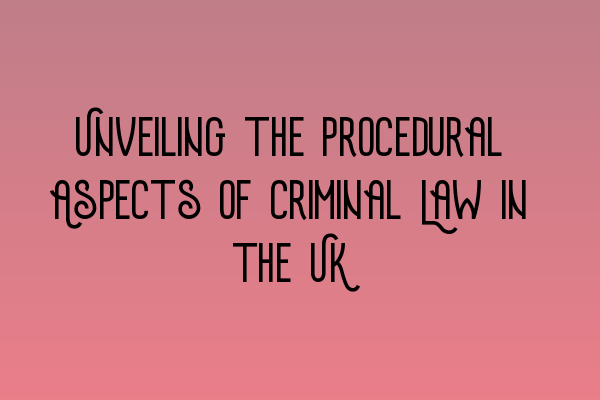Unveiling the Procedural Aspects of Criminal Law in the UK
The field of criminal law in the UK is complex and multi-faceted, encompassing a wide range of legal principles and procedural aspects. From the initial investigation to the final verdict, every step in a criminal case is governed by established rules and regulations that ensure a fair and just outcome. In this article, we will delve into the procedural aspects of criminal law in the UK, shedding light on the key stages and important considerations that shape the legal process.
1. Investigation
The first stage in any criminal case is the investigation. This is when law enforcement agencies gather and analyze evidence to determine whether a crime has been committed and who may be responsible. The police may conduct interviews, search premises, and collect forensic evidence, among other investigative techniques.
During the investigation, it is crucial to adhere to proper legal procedures to protect the rights of the accused and to ensure that evidence is obtained lawfully. Failure to do so may result in evidence being deemed inadmissible in court.
For more information on legal representation during the investigation stage, check out this article on Legal Representation for Delaware LLCs in the UK: Expert Advice.
2. Arrest and Charge
If the evidence gathered during the investigation suggests that a person may be responsible for a crime, the police may arrest and charge them. When making an arrest, the police must have reasonable grounds to believe that the person has committed an offense.
The suspect will then be informed of the specific charges against them and will be required to provide their personal details. They may also be advised of their right to legal representation.
3. Bail and Remand
After being charged, a suspect may be granted bail, which allows them to be released from custody while awaiting trial. However, bail may be denied if there is a risk of the suspect fleeing, interfering with witnesses, or committing further offenses.
If bail is denied, the suspect will be remanded in custody until their trial date. The court will consider various factors, such as the seriousness of the offense and the likelihood of the suspect appearing for trial, when making this decision.
4. Court Proceedings
The court proceedings in a criminal case involve various stages, each with its own set of rules and procedures. These stages include:
– Preliminary Hearings: These are hearings held to determine whether there is sufficient evidence to proceed with the case. The court may also address pre-trial matters during this stage.
– Trial: The trial is where the evidence is presented, witnesses are called, and both the prosecution and defense make their case. The judge or jury will then determine the guilt or innocence of the accused.
– Sentencing: If the accused is found guilty, they will be sentenced. The court will consider the nature and seriousness of the offense, the impact on the victim, and any mitigating or aggravating factors when determining the appropriate sentence.
For a more comprehensive analysis of the British legal system, including an in-depth look at UK criminal law, check out this article on UK Criminal Law: An In-Depth Analysis of the British Legal System.
5. Appeals
If a person is convicted and believes that there have been errors in the trial process or that the verdict is unjust, they have the right to appeal. The appeals process allows for a higher court to review the case and determine whether the original decision should be upheld, modified, or overturned.
Appeals can be complex and require a thorough understanding of the law. It is crucial to seek legal advice and representation when considering an appeal.
Conclusion
The procedural aspects of criminal law in the UK are essential for ensuring fairness, protecting the rights of the accused, and maintaining public confidence in the justice system. From investigation to trial and appeals, each stage is carefully governed by established rules and regulations.
For businesses operating in the UK, it is important to be aware of the legal challenges they may face, both domestically and internationally. To learn more about legal challenges for UK businesses operating in the US and strategies for overcoming them, check out this article on Legal Challenges for UK Businesses in the U.S.: Strategies for Overcoming Hurdles.
